Native women in WA are dying during and after childbirth. Could cash help?
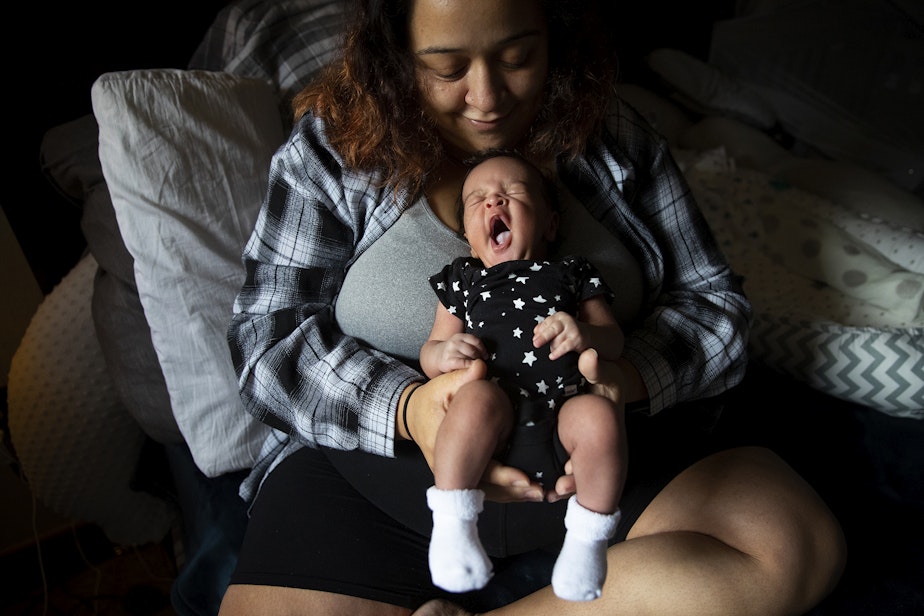
D
eita McChristian always knew she wanted kids. When she was a teenager, she dreamed of having a house full of them.
“I had drawn this whole futuristic house with every bedroom and named every child,” McChristian said. “Twelve kids was my number.”
So, when McChristian found out she was pregnant in early 2023, she was thrilled. But then things started to fall apart. She and her partner split up. A few months after that, she lost her job as a certified nursing assistant. She didn’t apply for new jobs because she worried about the physical demands of working in her third trimester, and she doubted employers would hire her right before she went on maternity leave. Instead, she applied for unemployment.
“The whole stress about losing the job is: What am I going to do to come up with all these funds?” McChristian said. “There’s car insurance, health care, emergency-type situations … rent, bills.”
Sponsored
McChristian thought that to make ends meet, she was going to have to go back to work right after having her baby. But then she heard about a no-strings-attached cash assistance program for pregnant Native women in the Seattle area. She applied.
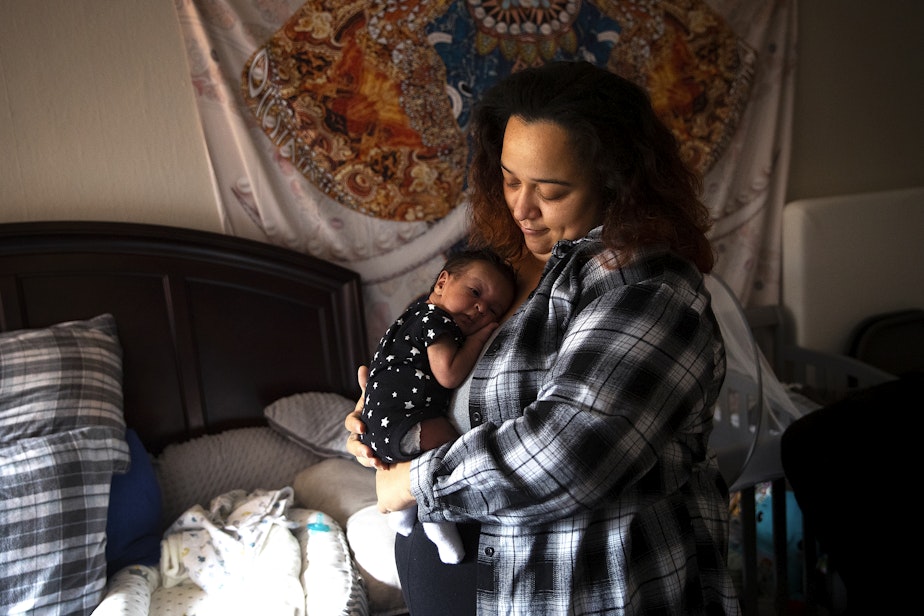
Native women are more likely to die during or shortly after childbirth than any other group in Washington state. Now, a nonprofit in the Seattle area is trying to tackle that with a new approach: cash. They hope the money will lead to better health outcomes — and that it will help families just enjoy their kids’ early years.
Sponsored
The cash assistance program, also referred to as guaranteed basic income, is open to all Native pregnant women in King or Pierce counties or on the Tulalip Reservation who are planning to parent and who make below a certain income: less than $100,000 for a family of four in King County, or less than $85,000 for a family of four in Pierce County or on the Tulalip Reservation. There’s enough money to fund 150 people, chosen through a lottery. The moms in the program get $1,250 per month throughout their pregnancy and until their child’s third birthday.
“We know when we give moms money that they spend it on what their family needs,” said Camie Goldhammer, the executive director of the nonprofit Hummingbird Family Services. She started the cash assistance program with funding from the Perigee Fund.
Goldhammer hopes that if moms are less stressed about money during pregnancy and early childhood, their health outcomes will be better. There’s evidence that should work: A program that gave small monthly payments to low-income pregnant women in Canada from 2003 to 2010 led to fewer preterm births, fewer low-birthweight babies, and increased breastfeeding.
“Prenatal and perinatal cash supplement is probably one of the most powerful instruments that we have in terms of guaranteed income,” said Eyitayo Onifade, a social work professor at Clark Atlanta University. “There's a connection between things like financial distress while a mother is pregnant, and the actual health of their baby when the baby is born.”
But, Goldhammer said, the money can be used for more than just basic needs like rent or child care.
Sponsored
“I also hope they use it to go to the aquarium, maybe go on vacation,” she said.
Goldhammer said she hopes giving moms the time and bandwidth to bond and have fun with their kids will interrupt intergenerational trauma and help kids’ brain development during the crucial early years.
“We can repair the harm that has been done to our communities for hundreds of years through love,” Goldhammer said.
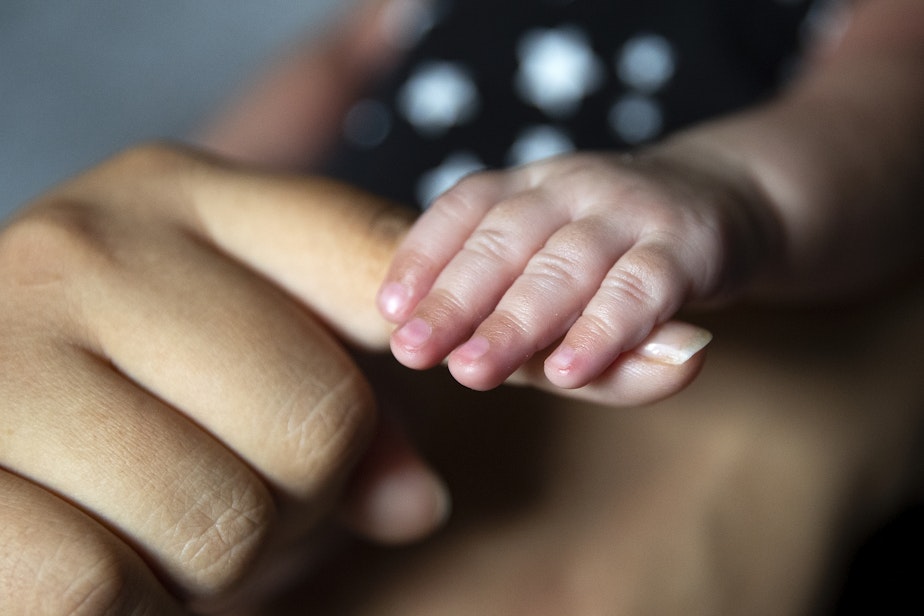
McChristian was one of the first moms chosen for Hummingbird’s program, and she got her first check a little more than a month before her son was born. So far, she’s using it to cover rent.
Sponsored
But she said the money’s doing more than just helping her cover her bills. It means she won’t have to go back to work right away, so she’ll have time to bond with her son. She said that’s important to her: She wants to make him feel wanted.
“My mom always made me feel like I wasn’t wanted,” she said. “When I turned 18, my mother told me that she never wanted me, and she wanted to put me up for adoption.”
During her pregnancy, McChristian read a book about how not to repeat harmful parenting or perpetuate intergenerational trauma.
“As long as [my son] knows that Mom is a safe place, that’s all that matters,” she said.
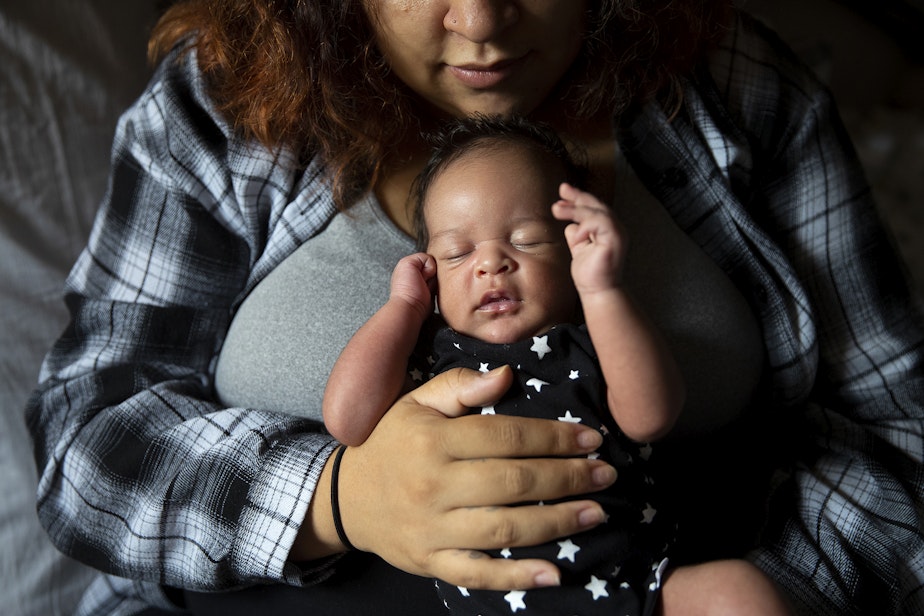
Sponsored
Unlike welfare, guaranteed income programs don’t generally require that people constantly prove that they’re seeking work.
“We often ask people to justify their disadvantaged state,” said Arjumand Siddiqi, a professor at the University of Toronto who studies guaranteed income’s health effects. “These kinds of criteria … are a little bit paternalistic and punitive in nature … The first effect they have is that they’re stressful.”
Siddiqi said making everyone below a certain income level automatically eligible for a cash transfer makes people feel less stressed, judged, and surveilled — which opens up the benefits to more people, and also has a positive effect on their health.
And the money itself is good for people’s health, Siddiqi added.
“It affects your ability to purchase food; it affects your ability to have adequate housing and stable housing,[and] to … have sufficient health care,” she said.
Sponsored
But this general approach of no-strings-attached cash payments is pretty controversial.
“A lot of what nonprofits do is driven by funders,” Hummingbird executive director Goldhammer said. “The idea of giving just straight up money to people is often prohibited by the people that are funding the nonprofits.”
“The fear that I think some people have is that individuals become dependent on the assistance,” Onifade, the professor in Atlanta, said.
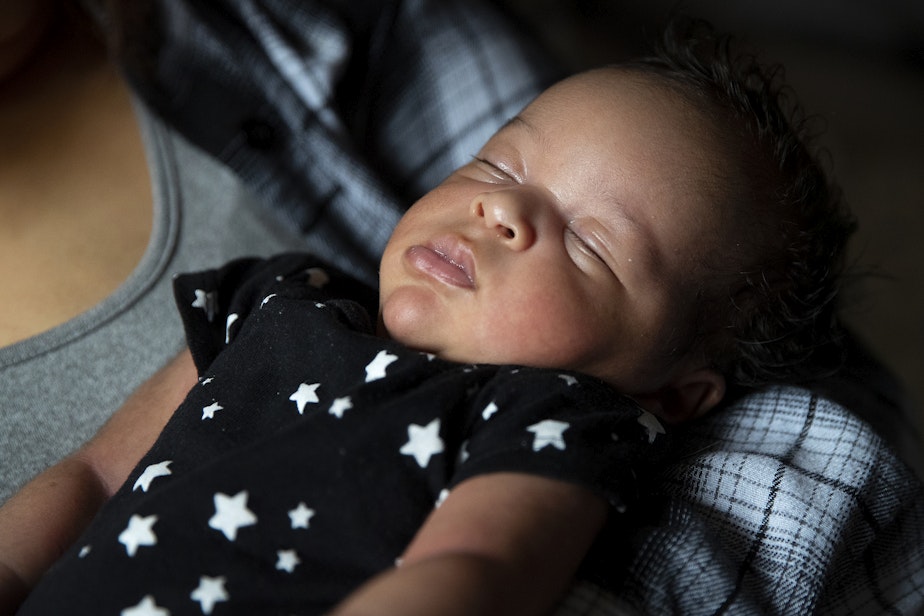
Onifade studied a cash assistance program for Black moms living in poverty in Jackson, Miss., with kids of any age — and “what we found was the exact opposite,” he said. “These cash supplements don’t create dependency; it actually creates a bit of resilience.”
The moms in Mississippi who received the cash payments worked more, borrowed less, and were less reliant than a control group on things like payday loans and emergency financing, Onifade said.
He said that cash assistance programs don’t generally provide enough money for people to stop working entirely, that many people work not just for money but for personal fulfillment, and that a financial cushion can help them access better jobs and opportunities. And, he said, some of the moms in the program started their own businesses.
Empowering people to solve their own problems can also create resilience, Onifade added — in contrast to government vouchers that only cover food or housing, for instance.
“Sometimes the difference between you being able to cover your bills and not being able to cover your bills is whether or not your car is functioning,” Onifade said. “If you give someone cash, they can use that to deal with the problem at hand.”
Onifade said the number of guaranteed basic income programs nationwide has nearly quadrupled in the last five years, almost all funded by private foundations. But, he said, most have been pilot or demonstration programs that lasted only a year or two.
Onifade said he’d like to see guaranteed income at a larger scale, for a longer time — but that would require government funding.
“At one point it has to be integrated into our core governance at the state and federal level,” he said.




